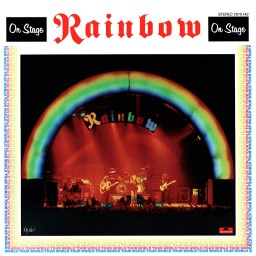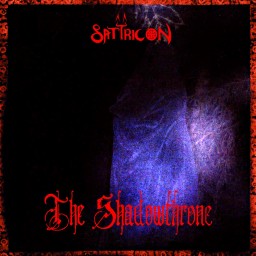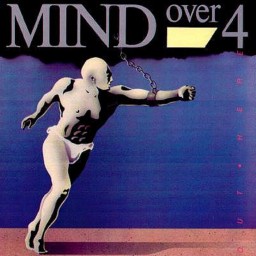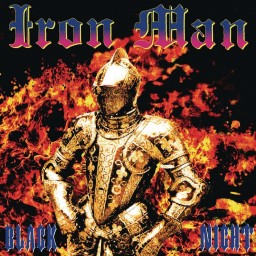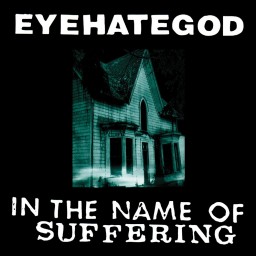Dwightfryed's Reviews
Some bands are much-ballyhooed, and others just don’t get enough ballyhoo at all. Cyclone have suffered from a severe ballyhoo deficiency since I first heard the ’85 demo cuts on some underground cassette radio show (early 80s equivalent to a YouTube channel). Even at such a young, naïve, impressionable age, I remember thinking, “Is this Exodus?”
It is very much like Exodus. Singer Guido Gevels’ O-ring popping wails are fashioned directly from the Paul Baloff school of unwashed denim, while the leads mimic Gary Holt’s high-pitched crawling-up-the-neck shtick. Even so, Brutal Destruction is a gut-punch of an album, a strange security blanket that I had for years on vinyl, and then ran right out to get when CDs came into vogue. It’s brainless thrashing mayhem, plain and simple. Copious doses of riff-crunch are packed into these 8 songs, which often cycle through that tried-and-true dramatic pattern: everything falls away except for one sinister guitar riff, and then….Crash! Crash! Crash! go the drums, bass, and second guitar in a tribal sound that forces metalheads within earshot to sway their heads to the call (Think the first minute of Slayer’s “Evil Has No Boundaries” – yeah, that).
At any rate, these Belgians were quite adept at moshable moments like the above, “Fall Under His Command” is a great example, Gevels shrieking loudly enough to send all domestic animals out of the room within the first minute. “Fighting the Fatal” is another crusher, just unadorned ritualistic headbanging exercises with a main riff that just crackles with evil static.
Add this one to your next classic thrash listening binge. Play it until your parents move out and all the appliances stop working. This was the best thing from Belgium until they came out with their IPA.
Genres: Thrash Metal
Format: Album
Year: 1986
There’s just something about the magic of this band, particularly compared to Blackmore’s previous exploits - Purple was classical gas meets heavy blues, that pounding, racing organ just crashing through like a meteor shower on the roof. Rainbow is elegance, fantasy, delicate brush strokes and swinging white Stratocasters. Rainbow is Ronnie Dio’s throaty bluster as a triptych to his world of shining castles and deft sorcery.
“On Stage” is stacked with legendary players Powell, Bain, Blackmore, Tony Carey and RJD spinning their pioneering fantasy metal in front of German and Japanese crowds. The tracklisting is strange right off the bat - just the type of unexplained oddity we would come to expect from Blackmore. Recorded on the Rising tour, but there’s hardly any Rising material. If you’re anything like the rest of us, this represents more than a slight disappointment, but if it’s any consolation, the performances are stellar, and for fans of the man’s impeccable fretburning coupled with that titanic voice, “On Stage” is a must-hear (and incidentally, there’s a dreamy version of “Stargazer” on the ’76 Live in Germany collection, but the drums are sort of buried in the mix on that one).
It may not be cut from a single performance, but it flows like one – with a single exception. The dueling interplay between Carey’s warbling keyboard squiggles and Ritchie’s spacy bends during the blues jam in the “Man on the Silver Mountain” medley is abruptly interrupted by a few bars of “Lady Starstruck” (inaudibly, the crowd murmurs I told you they had a new album!) and an awkward fit of Dio’s vocal improvisation before finishing out the song. Yeah, it’s weirdly forced – like the band didn’t want to include any Rising material at all. I’ve never understood it. Plus, the record starts with “Kill the King” and nobody had even heard that one yet. Clearly, Ritchie is in charge of song selection. Hide the lutes!
“Catch the Rainbow” smooths over the confusion with all the lavish grandeur synonymous with this band, every player swelling the melodrama, from Dio’s perfect vocal to Bain’s warm bass, the majesty of the keys to torrents of guitar licks and volume-knob swells that walk the tightrope between classical and blues. It’s obvious the band is most comfortable with the material from the first album, stretched out here and there, “Still I’m Sad” lengthened from four minutes to about eleven, but those keys dish out more pomp than a Papal ceremony. The addition of Coverdale’s “Mistreated” is another oddity on the record, a song that would be come a regular concert staple. RJD knocks it out of the park, and Ritchie conjures perhaps the most intricate, breathtaking solo of the entire show, expanding an already long song into a scintillating jam.
I’d be remiss if I didn’t mention the megawatt rainbow stage prop so proudly described on the back of this gatefold sleeve, 40-foot span across the stage, 29 feet high in the middle, 3000 light bulbs, first of its kind in the world, yada, yada. Every piece of equipment is also listed from 6 crown DC300A Power Amps to “1 aluminum stand for pipe organ” – there’s no arguing, the guy who did the liner notes was a stickler for detail.
Suffice to say, I’ll never understand the glaring omissions from the band’s greatest album (Rising should be played in its entirety if you ask me), but the material from the first record is performed with such stunning depth and gusto for "On Stage", the studio versions are pretty much rendered flat by comparison.
That’s probably why I have it on CD and vinyl - either means it’s one of my favorite records or I just stole somebody else’s copy while drunk. Wouldn’t be the first time….
Genres: Non-Metal
Format: Live
Year: 1977
1994's “The Shadowthrone” may well have been my personal gateway drug into black metal. True to form, it’s a slightly tighter carbon copy of the debut in terms of content. Satyr still the doom-summoner, his Norwegian/English vocals bringing forth evil from the dark woods, cackles snapping and rising over primal Norwegian metal. Tempos shift constantly, triumphant keyboard fanfares rise like spirits and then dissipate, Frost’s bass drums clunk with cantankerous reverb, and those gorgeous bursts of tremolo-picked dissonance take off abundantly without warning.
Now-iconic material like “The King of the Shadowthrone” is ornamental work – compelling metalsmith fare. The main riff sporting a sort of pagan pomposity- grand and bordering on regal, but this trio rarely rests on their laurels long enough to ram it down main street, tempos constantly morphing into hooky midpaced pilgrimages, breathtaking acoustic interludes and blasts of hyperspeed. There’s no restlessness in the song structures, despite the constant changes – just the frosty atmosphere of foreboding epics crafted by true artisans taking classic metal to the next level. The violent double-bass, swelling mystics, and melodic gits of “Woods to Eternity” drink from the same evil-informed well of high-minded traditional metal, Satyr hissing, “This must be the desolate land…” as the drums shift into a fit of rattling speed.
It's not the most aggressive, hate-gargling black metal ever created, but I like the musicality of the record. The aforementioned acoustic and clean segues and other assorted pace-changing diversions give the album an air of evil grandiloquence and make it an easy transition record for fans of classic heavy metal into the realm of the grim. Early Satyricon doesn’t get the respect it deserves, despite the smorgasbord of Christ-hating goodies on display. The band would only get better with time, but don’t overlook the delicate intricacies buried under this forgotten tombstone. I tend to think of the early records as black metal’s answer to early Genesis. Regardless, this one still ticks all the boxes for me.
Genres: Black Metal
Format: Album
Year: 1994
- 1987 was a year that just seemed dominated by The Bangles and Whitesnake and whatever else at the time, but with the benefit of hindsight turned out to be a watershed year for classic and forward-thinking rock albums across multiple genres. Tragically, most of the oxygen-breathing populous looked obliviously past the full-length debut of Los Angeles soothsayers Mind Over Four - unforgivable to be certain, particularly for those that consider themselves harvesters of unhinged, whip-smart progressive metal. It’s as good a place to start as any with this bunch of bionic, iconic genre-traversing shamans as each MoF record is a unique, unmoored thrill-ride-of-sorts.
The band just seems to know things the rest of us don’t. Boyd Michealson’s guitars don’t strum or chug, they aggressively oscillate. Mark Fullerton’s drumming flows like the gallop of some untamable beast, stretching and bounding with an inherent rhythmic beauty as raw and real as it gets. Of course, Spike Xavier’s vocal performances fall somewhere between an intergalactic space busker and warpainted witch doctor. The freewheeling spontaneity on this record is just barely curbed by the acumen of the players, making for an extraordinary listen time after time.
Drop the needle, pick a spot and let the tidal waves of kerazee break over you. “Martin’s Song” with its jazzy bassline, and harmonic-studded chimes as the plank that Xavier walks, improvising and philosophizing with cool drollness. An icepick-sharp lead from Michaealson springs to life occasionally. “Pity”, riding crests of high-speed-chase guitars and Xavier’s booming outcries, “Even in their small talk they cannot shield their pity.” Much like the late, great John Stewart of Slauter Xstroyes, Xavier free-forms his own meter, his own accents, his fits of spoken word - grappling, channeling overwhelming emotion. The performance he conjures in the uber-knotty “The Other with the Other / The Letter” still comes across daringly stubborn and unyielding.
“Out Here” is a shot across the bow – it’s a record that takes years to fully unpack, a startling cross-section of baked-in virtuosity and punked-up aggression promised by many but delivered by a select few. Mind Over Four had arrived.
Genres: Alternative Metal Progressive Metal
Format: Album
Year: 1987
While bands like The Obsessed and Internal Void swirled elements of psych and acid rock into their riffy chowder, Alfred Morris’ Iron Man kept his band steeped in the realm of early Sabbath (they were initially a Sabs cover band). True to the spirit of their Birmingham heroes, Iron Man were all about the riffs. Morris dials up one torrid roar after another, his guitar tone flowing like maple syrup left boiling on the stove for two weeks. A staple Helhound release, their 1993 debut is a legendary grail for doom-hounds looking to climb this Baltimore band’s wall of sleep.
There’s just something special about this record – the blocky drum sound of Ron Kalimon, the sharp bass gymnastics of Larry Brown, and Morris’ grungy subsonics forging the next generation of Iommi worship into an essential doom document. The riff clouds of “A Child’s Future” are simply vicious, Morris’ claustrophobic thunder eventually spreading out against Kalimon’s airy groove in a spectacular wah-laced solo. “The Liar” bursts forth with chugging speed a la “Neon Nights”, and “Vampires” oozes with primal tar, middle-finger raised, desperate themes of doperunning flashing through the planet caravan – a track borne of city grit.
Rob Levey’s pitchy yelps are a bit of an acquired taste, the band struggling to find the right singer over the course of the first few records. But the gut-punch of the guitars are strong enough to gloss over most of his vocal limitations. They weren’t road dogs like many of the other bands playing this style, but if you were lucky enough to wander into a seedy dive in Philly or DC on the right Wednesday night in the late 90s, seeing the late, great riff wizard Al Morris in action was nothing short of metallic rapture. Like the early Asylum stuff, it couldn’t be further from the domain of rock ‘n roll flash - just unassuming blue-collar doom fanatics from Baltimore pounding out an unholy racket. Definitely one for your wish list.
Genres: Doom Metal
Format: Album
Year: 1993
Black Flag, Flipper, Melvins…and then this thing…which seemed to make a mockery of all of them. A vile, raging fit of anguish - a band channeling its drug-addled misery into disgust-o-sonics that invited listeners to share their torment on an intimate new level. Originally released on a tiny French label, EHG’s debut stands as a cornerstone release for what would become the original raw, unfiltered plague upon this world known as sludge metal. The style would be frankensteined into a hundred different subgenres, almost all of which were tidier, tamer, meet-yer-mama variations. Visit all of them…take a tour. Afterwards. returning to this despicable lowlight of art lit up with pain will have even more significance.
There’s an appeal to the first record that is lost on the others. The fits of speed in “Run it Into the Ground” and “Hit a Girl” are a part of it, emphasizing the depth of vitriol and linking these songs a little more directly to hardcore than the records that would follow. The riffs are the worst kind of roaring dreck, and I mean that in the most complimentary way, some of Jimmy Bower’s slashes across those low strings shatter my wrecked, shaken psyche like nothing before or since. Mike Williams is the devil incarnate on this record, croaking and wallowing in hopelessness like a sewer rat bleeding out for 35 minutes. The lyrics to something like “Left to Starve” are so bare and dry, “I scar my body like a good boy”. No sense of irony, no samples that go on far too long, Just sloth-like rhythms, cavernous drums, animals looking to be put out of their misery on every beat, every squealing riff, every wail of hopelessness.
There’s not a gimmick to be found here, nothing that ties the record to a particular time frame, it’s low-flying joylessness and the boiling muck of those riffs are still like visiting a mecca of abrasiveness so many years after the fact. Not sure if Mike IX and his pack of strays ever reached this lowlight again, but goddam what a record.
Genres: Sludge Metal
Format: Album
Year: 1992











